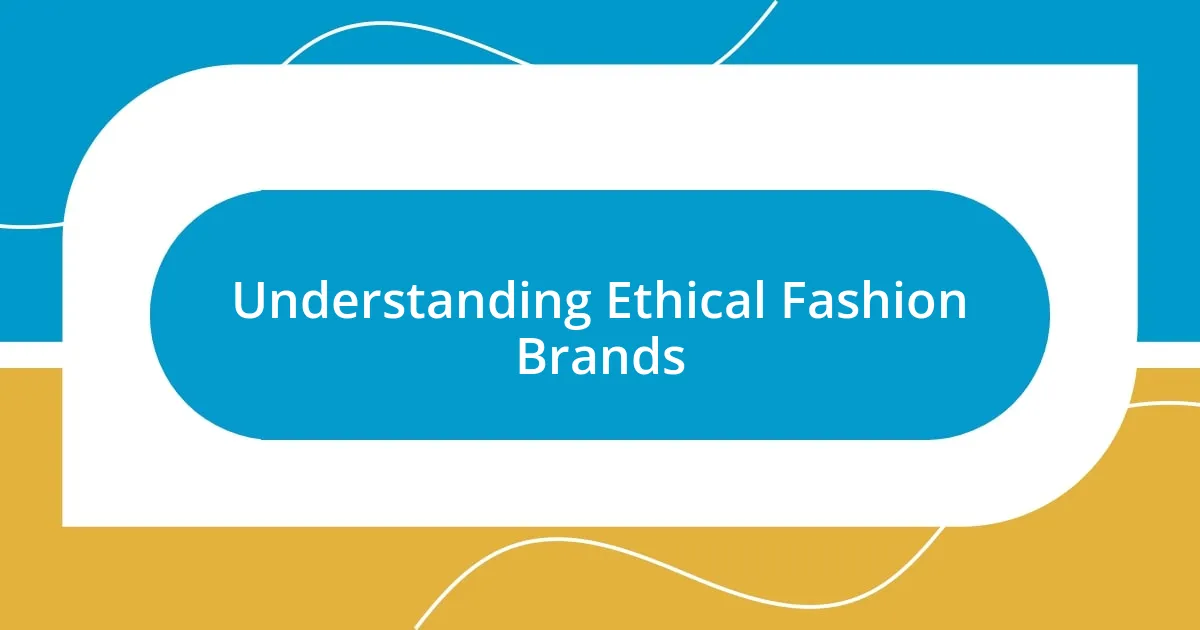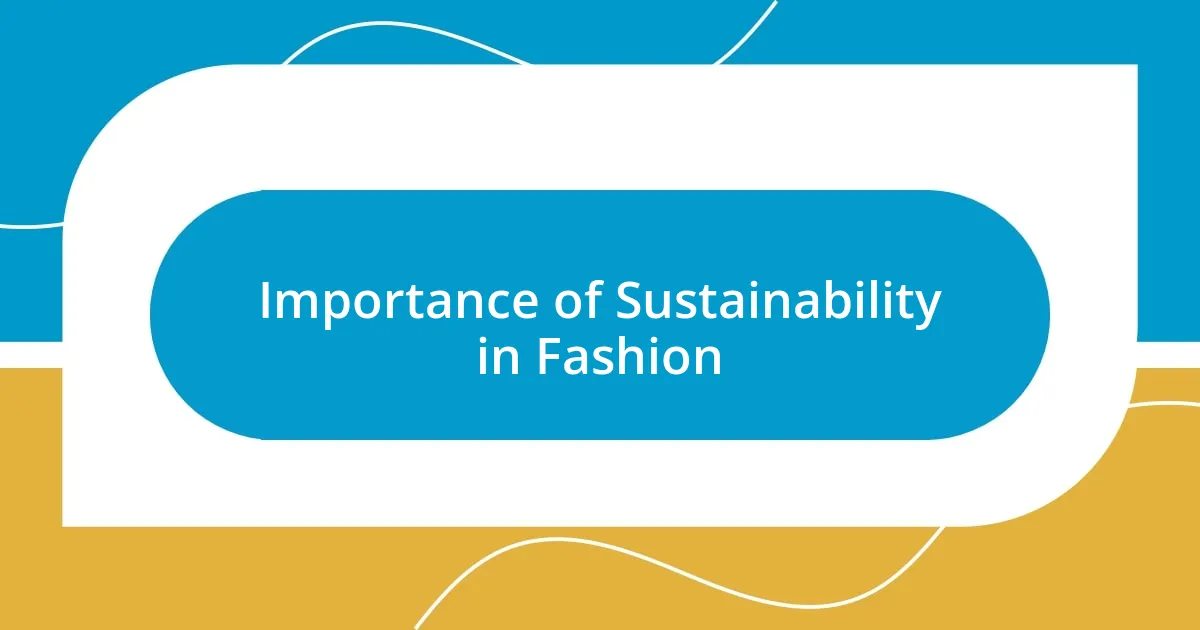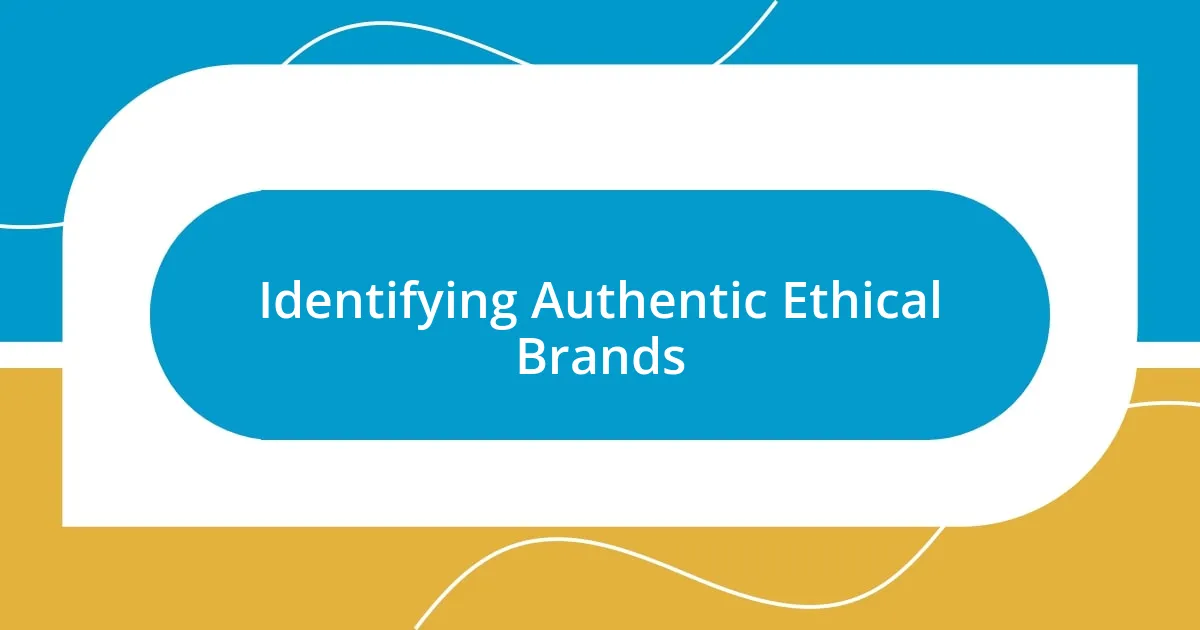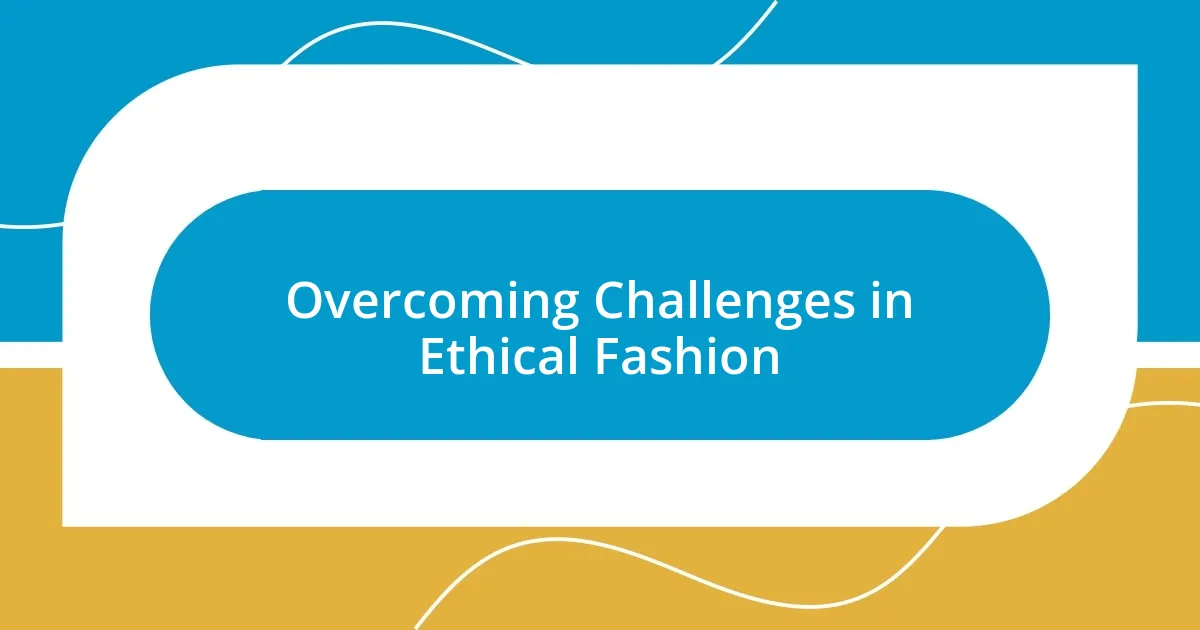Key takeaways:
- Ethical fashion brands focus on sustainability, fair labor, and responsible materials, creating a meaningful connection between consumers and their clothing.
- Sustainability is crucial in fashion, reducing environmental impact and promoting ethical labor practices while encouraging investment in quality pieces.
- Authenticity in ethical brands is determined by transparency in production, verified certifications, and direct engagement with consumers.
- Challenges include higher prices and skepticism about the impact of choosing ethical brands, but these can be overcome by valuing long-term benefits and sharing personal experiences to inspire others.

Understanding Ethical Fashion Brands
Ethical fashion brands prioritize sustainability, fair labor practices, and environmentally friendly materials. I remember when I first learned about the impact of fast fashion on the planet; it motivated me to research brands that align with my values. Doesn’t it feel empowering to know you’re making a difference with your purchases?
The journey to understanding ethical fashion can feel overwhelming at times. There are terms like “fair trade” and “eco-friendly” that can leave you scratching your head. I’ve often wondered, what does it really mean to wear a piece of clothing that is crafted with care? For me, it’s about connection – knowing the story behind each item I wear brings a deeper appreciation for fashion.
When I stumbled upon a local ethical brand showcasing their artisans, it changed my perspective entirely. I felt an emotional pull as I learned about the people behind the products—their skills, stories, and dreams. Isn’t it fascinating how fashion can bridge gaps between cultures and ideas, bringing us all closer together?

Importance of Sustainability in Fashion
Sustainability in fashion isn’t just a trend; it’s a necessity. Each time I choose a sustainable brand, I feel a sense of relief, knowing I’m supporting practices that protect our planet. I vividly recall the moment I discovered the staggering amounts of waste generated by the fashion industry. It hit me hard; this realization spurred me to rethink not just what I buy, but also how those choices impact the world around me.
Here are some critical reasons why sustainability matters in fashion:
- Environmental Impact: Sustainable practices help reduce pollution, waste, and resource depletion.
- Ethical Labor: Many ethical brands ensure fair wages and safe working conditions for workers, promoting human rights.
- Quality Over Quantity: Sustainable fashion often emphasizes quality, encouraging consumers to invest in timeless pieces that last longer.
- Cultural Preservation: Supporting ethical brands can help maintain traditional craftsmanship and unique cultural practices.
- Consumer Awareness: By choosing sustainability, I contribute to a movement that educates others about their impact on the environment and society.
I feel a stronger connection with my wardrobe when I know the stories behind the clothing. Each piece has a journey that transcends mere aesthetics; it’s about advocating for a future where fashion respects our planet and its people.

Identifying Authentic Ethical Brands
Identifying authentic ethical brands can sometimes feel like navigating a maze. I’ve been there, often finding myself lost in marketing buzzwords or misinformed claims. When a brand truly aligns with ethical principles, transparency is key. Look for clear information on their production processes, sourcing of materials, and labor practices. If they showcase their story—like one brand I found that openly shared their artisans’ journeys through captivating videos—I feel more inclined to trust them.
Another useful tip is to check for certifications. You might come across labels like Fair Trade and GOTS (Global Organic Textile Standard) that signify adherence to certain ethical standards. During my research, I made sure to explore how these certifications relate to the brand’s actual practices. I once discovered a brand with great marketing but lacking strong verification of their claims. This experience taught me that not all that glitters is gold; authenticity often comes with evidence.
Lastly, engaging with the brand directly can provide useful insights. Reach out with questions or read their FAQs—genuine brands usually welcome interaction and value customer feedback. I recall a delightful chat I had with a brand founder about their sustainable practices, which not only reassured me but also deepened my appreciation for their mission. Building that connection is not just about what we wear but about the values we embrace.
| Criteria | Indicators of Authenticity |
|---|---|
| Transparency | Clear information on production processes and sourcing |
| Certifications | Fair Trade, GOTS, and other ethical standards |
| Engagement | Open communication and responsiveness to customer inquiries |

Overcoming Challenges in Ethical Fashion
One of the primary challenges I’ve encountered in ethical fashion is the confusion surrounding pricing. Initially, I felt deterred by the higher price tags of sustainable pieces compared to fast fashion items. But then I asked myself, isn’t the long-term value worth it? Investing in quality, ethically-made garments means I’m not only reducing waste but also supporting fair labor practices. That shift in perspective made all the difference.
Finding ethically produced clothing that matches personal style can also be a struggle. I remember scouring various brands, feeling frustrated when what I liked didn’t align with my values. I came to realize that this journey requires patience and a willingness to explore diverse options. Often, stepping out of my comfort zone led to unexpected discoveries, like a handmade dress from an artisan collective that has since become a staple in my closet. The joy of wearing something unique that also carries a meaningful story is truly rewarding.
Another challenge I’ve faced is dealing with skeptics who question the impact of choosing ethical brands. I recall a conversation with a friend who dismissed my efforts as a drop in the ocean. But I firmly believe that every choice matters. It took time, but I learned to share my experiences—to highlight how consumer choices can collectively influence corporate behavior. Each small step contributes to a larger movement, and my commitment became a source of inspiration for others to consider their own buying habits. Isn’t it exhilarating to think how together we can create change?














